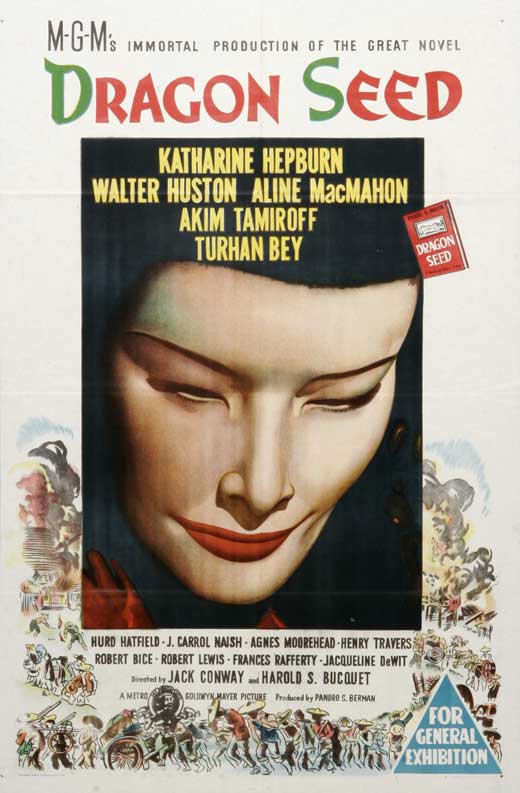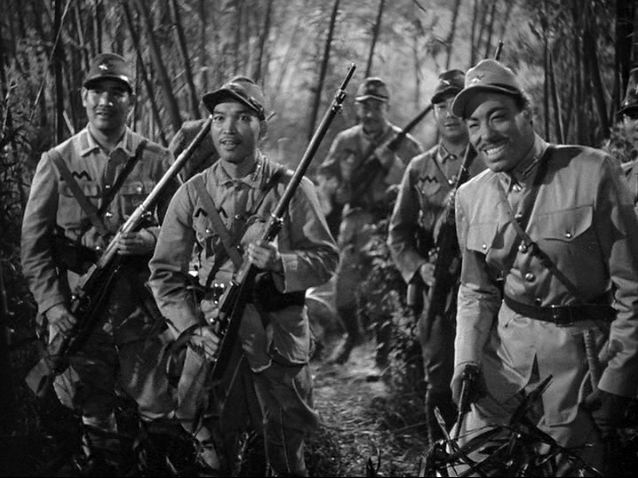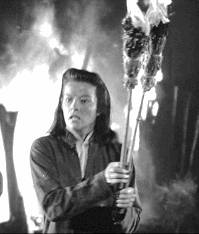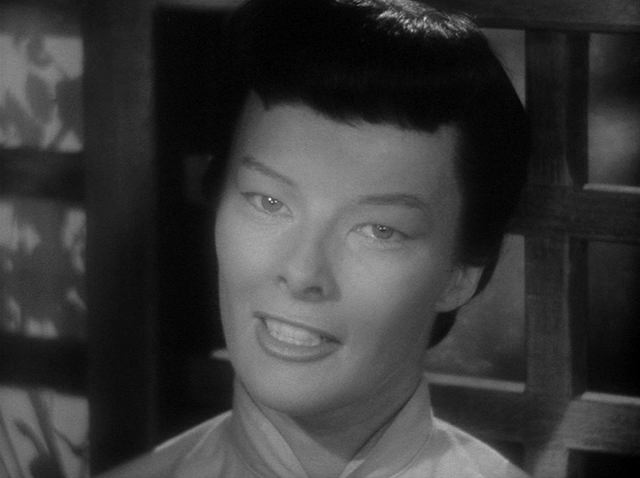Episode 20 of 52 of Anne Marie's chronological look at Katharine Hepburn's career.
 In which Katharine Hepburn dons yellow face for the war effort.
In which Katharine Hepburn dons yellow face for the war effort.
Did you celebrate Kate’s birthday on Monday? Early in my Hepburn idolatry, I used to bemoan the fact that I missed sharing her birthday by just two days. This year, however, I was excited. “My birthday is on a Wednesday this year,” I thought gleefully to myself. “I can celebrate both our birthdays with A Year With Kate!” Turns out the joke was on us. Happy Birthday, Kate and Anne Marie. Let’s talk about racism.
When you are a fan of the Studio System Era, you learn to live with certain uncomfortable truths about Hollywood’s so-called Golden Age. Films were overtly racist, sexist, and homophobic in ways that thankfully would never be tolerated now. As a modern viewer, how do you make peace with it? The answer, at least for me, has been to acknowledge (though not forgive) the various forms of bigotry that run rampant through these films. However, my attempt at benevolent righteousness stalls when confronted with Katharine Hepburn in all her yellowface shame and glory in Dragon Seed. This is a movie that is not only overtly racist with its cast of white actors in “Oriental” makeup, but--more dangerously--subtly racist in its attitudes towards both the evil Japanese soldiers and the good Chinese farmers. Dragon Seed is proof that good intentions do not make up for terrible bigotry.
[More after the jump if you dare...]
Dragon Seed was chock full of good intentions. It was intended to be Oscar bait, following the successful adaptation of The Good Earth by Pulitzer Prize-winner Pearl S. Buck, which had netted two Oscars in 1937. It was a war film, rallying Americans to protect their Chinese allies in the Pacific theater. The story was well-intentioned, too: A family of peasant farmers in 1930s China are invaded by the Japanese and fight to regain their freedom. However, when Walter Huston as the patriarch appears to intone his first speech of contraction-less English, it’s clear that these Chinese men (to borrow a line from Mel Brooks) are just simple farmers. These are people of the land. You know... morons.
It’s a painfully familiar stereotype: The Noble Savage, simple and pure. Wearing absurd eye prosthetics and eyeliner, white actors play “Oriental” with big quotation marks around their performances. These aren’t human characters; they’re slant-eyed puppets. Even Kate is guilty. She plays Jade Tan, a character who absurdly straddles the gap between naive Chinese peasant stereotype and strong-willed Katharine Hepburn heroine. Jade wants to own a book! But she doesn’t know what kind of book. She wants to support the war! But she doesn’t understand the war. Adding to the discomfort is the fact that Kate’s eye prosthetics freeze the top half of her face and cover her eyes. The result doesn’t convey “innocent Chinese farmer” so much as “plastic surgery horror story.”
When the Japanese arrive, it’s immediately evident that they are the Brutal Savages, here to destroy the innocence of the simple Chinese farmers. That’s not a metaphor. The first time the Japanese soldiers appear on screen, they are tracking a young mother and her two children. As the soldiers advance, the young mother stands and runs, but not before the Japanese soldiers get an appreciative eyeful. They slowly advance on her, grinning like cartoon devils. The camera pans away as the woman screams. Later, her husband carries her partially exposed body back to the farm; her clothes have been torn to shreds. This may be the closest to explicit rape a 40s Hays Code movie ever got. When we go to war, we have to find a way to demonize the enemy. However, I can’t think of one movie made during WWII where German soldiers gang rape a young girl.
 A grinning caricature and some Asian extras for ambiance
A grinning caricature and some Asian extras for ambiance
Dragon Seed is a travesty not just because it casts white actors, but because it has those actors play “Oriental” characters. Nowadays, we have to contend with fewer cases of yellowface, but the explanations for yellowface during WWII would sound painfully familiar to any minority actors trying to find work today: audiences want to see stars in the lead roles, they can’t play the part convincingly, they’re not quite “right.” In the case of Dragon Seed, Asian actors were too human for the overblown caricatures being portrayed. Though we’ve moved past yellowface for the most part, we still haven’t overcome the more subtle versions racism in media. We should keep watching movies like Dragon Seed, if only because they make us uncomfortable and aware.

 Previous Weeks: A Bill of Divorcement, Christopher Strong, Morning Glory, Little Women, Spitfire, The Little Minister, Break of Hearts, Alice Adams, Sylvia Scarlett, Mary of Scotland, A Woman Rebels, Quality Street, Stage Door, Bringing Up Baby, Holiday, The Philadelphia Story, Woman of the Year, Keeper Of The Flame, and Stage Door Canteen.
Previous Weeks: A Bill of Divorcement, Christopher Strong, Morning Glory, Little Women, Spitfire, The Little Minister, Break of Hearts, Alice Adams, Sylvia Scarlett, Mary of Scotland, A Woman Rebels, Quality Street, Stage Door, Bringing Up Baby, Holiday, The Philadelphia Story, Woman of the Year, Keeper Of The Flame, and Stage Door Canteen.
Next Week: Without Love (1945) - In which Katharine Hepburn wears a fish bowl on her head for science.
